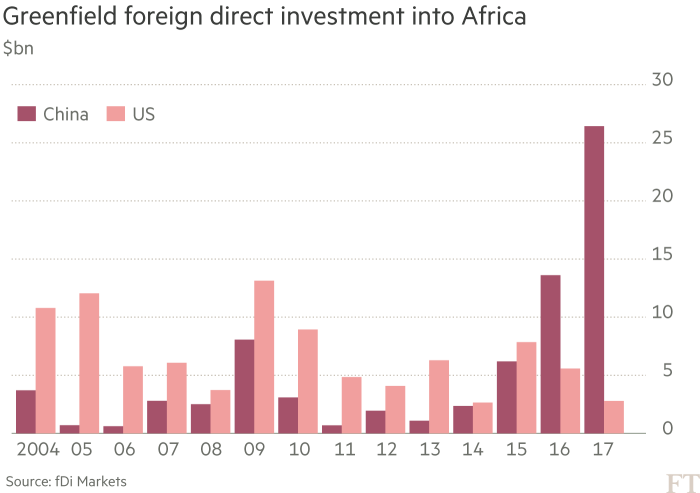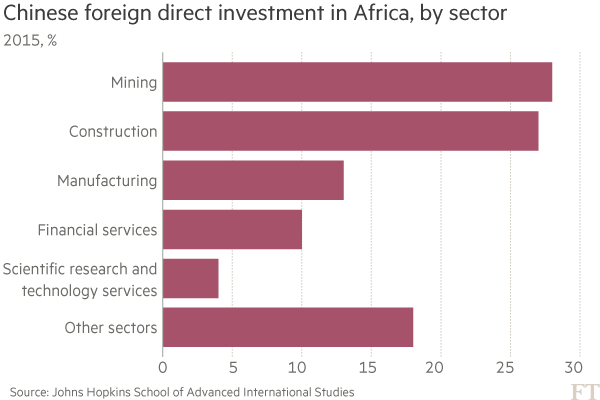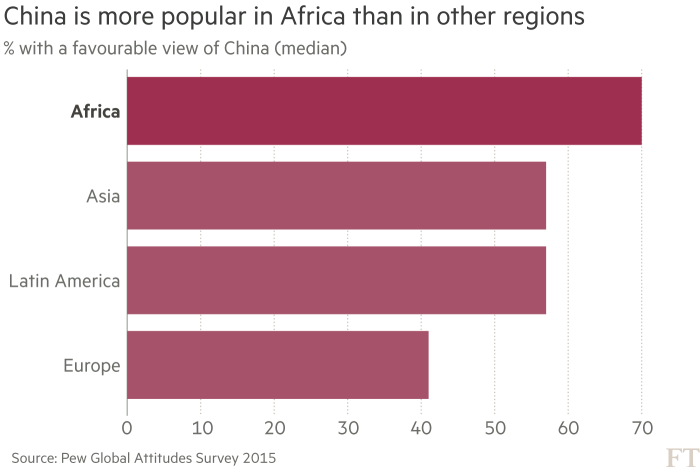

| 送交者: 氯原子[☆品衔R3☆] 于 2017-06-18 12:11 已读 1745 次 | 氯原子的个人频道 |
Chinese investment in Africa: Beijing’s testing ground 非洲:中国雄心的试验场 The country’s politicians, lenders and businesses eye opportunities for growth and greater geopolitical influence THE FINANCIAL TIMES David Pilling 作者: 戴维•皮林(图片:西方国家纷纷放弃非洲之际,中非关系正在改变非洲大陆的商业和政治重心。外界往往容易忽视,非洲在中国扩张国际影响力进程中所扮演的角色) On Pate Island, off the coast of northern Kenya, there are light-skinned Africans with Chinese features, fragments of ancient Chinese porcelain, and even a place named “New Shanga”. All lend weight to a local story that shipwrecked sailors from the fleet of Zheng He, the 15th-century Chinese explorer, settled on the island many years before Columbus set foot in the US. 在肯尼亚北部海岸的帕泰岛(Pate Island)上,有一些肤色较浅、有着中国人相貌特征的非洲人,那里还有古代中国瓷器的碎片,甚至还有一个名为“新尚加”(New Shanga)的地方。这些似乎都印证了当地的一个故事,15世纪的中国探险家郑和的船队中遭遇事故的水手们在这个岛上定居下来,比哥伦布(Columbus)登上美国土地要早很多年。 Whether or not there are descendants of the great Chinese helmsman’s crew in Kenya, records show that huge ships reached the east African coast more than 500 years ago, swapping Chinese treasures for exotica such as ivory, ostriches and zebras. Indeed, there is a long if tentative history of contact between China and Africa, cemented under Mao Zedong in the 1960s with anti-colonial solidarity and the construction of engineering works, notably the 1,860km Tanzam railway linking Zambia with the Tanzanian coast. 不管在肯尼亚是否存在这位中国伟大航海家的船员的后裔,有记录显示,500多年前,曾有大型船只抵达非洲东海岸,用中国的珍宝交换了象牙、鸵鸟和斑马等异域奇珍。实际上,中非交往可能有着悠久的历史,上世纪60年代在毛泽东的领导下,通过反殖民团结和工程建设,中非关系得以巩固,特别是长达1860公里的连接赞比亚与坦桑尼亚海岸的坦赞铁路。 In the past 15 years, however, the level of engagement by Chinese state-owned enterprises, political leaders, diplomats and entrepreneurs has put centuries of previous contact in the shade. 然而,过去15年,中国国有企业、政治领导人、外交人士和企业家与非洲接触的程度,让之前中非几百年的关系相形见绌。 The China-Africa relationship — partly spontaneous and partly the fruit of an orchestrated push from Beijing — is shifting the commercial and geopolitical axis of an entire continent that many western governments had all but given up on. While Europeans and Americans view Africa as a troubling source of instability, migration and terrorism — and, of course, precious minerals — China sees opportunity. Africa has oil, copper, cobalt and iron ore. It has markets for Chinese manufacturers and construction companies. And, perhaps least understood, it is a promising vehicle for Chinese geopolitical influence. 中非关系(一部分是自发的,还有一部分是中国政府精心推动的结果)正改变整个非洲大陆的商业和地缘政治重心。很多西方政府几乎放弃了这块大陆。欧洲和美国把非洲视为一个令人担忧的不稳定、移民和恐怖主义的来源——当然这里还有宝贵的矿产。而中国看到了机会。非洲拥有石油、铜、钴和铁矿石。它为中国制造商和建筑公司提供了市场。或许人们最没有领悟到的是,它是中国地缘政治影响力的一个未来可能很有用的工具。 “To have 54 African [nations as] friends is very important for China,” says Jing Gu, director of the Centre for Rising Powers and Global Development in East Sussex, who contrasts Beijing’s mostly good ties with African governments with the tense relationship it has with neighbours from Tokyo to Hanoi. 英格兰东萨塞克斯郡的崛起力量及全球发展中心(Centre for Rising Powers and Global Development)的主任Jing Gu表示:“有54个非洲(国家做)朋友对于中国非常重要。”她把中国与非洲各国政府基本良好的关系和中国与邻国(从日本到越南)的紧张关系进行了对比。 Many, including some Africans, are suspicious of what they see as a neocolonial land grab, in which companies acting as proxies for the Chinese state extract minerals in return for infrastructure and finance that will saddle governments with large debts. The behaviour of Chinese actors in Africa, in common with those from the west, has often fallen short of the exemplary. There have been legitimate complaints about Chinese companies employing few locals, mistreating those it has and paying scant regard to the environment. 包括一些非洲人在内的很多人,对被他们视为新殖民主义掠地的行为心存疑虑——代表中国政府的公司在这里开采矿产,作为建设基础设施和提供融资(这些将让当地政府欠下巨额债务)的回报。中国公司在非洲的行为通常算不上典范,与西方公司一样。对于中国公司聘用当地人很少、不善待聘用的当地人和对环境的漠视,外界的担忧是合理的。 Nevertheless, there is a begrudging recognition that China has mostly benefited Africa and that the country’s participants on the continent have learnt lessons. 然而,他们也不情愿地意识到,中国基本上让非洲得到了好处,在非洲开设业务的中国公司也吸取了教训。 *** *** Beijing’s engagement with Africa is more multi-layered than is often recognised. China, Ms Jing says, has used Africa almost as a testing ground for its growing international ambitions, whether through peacekeeping missions or construction of the roads, ports and railways intended to bind much of the developing world, via a new Silk Road, to the Middle Kingdom. 北京方面与非洲的交往比外界通常看到的更加多层次。Jing Gu表示,中国已把非洲几乎当成了其不断壮大的国际雄心的试验场——无论是通过维和行动,还是公路、港口、铁路的建设,后者旨在通过一条新丝绸之路(Silk Road)将大片发展中世界与这个中央王国(Middle Kingdom)捆在一起。

Howard French, whose book China’s Second Continent charts the experience of about 1m Chinese entrepreneurs who have settled in Africa, agrees. “Africa has been a field where China can try various things in a very low-risk environment,” he says. “Africa has been a workshop of ideas that now have a much bigger scale and strategic significance.” 《中国的第二块大陆》(China’s Second Continent)一书的作者傅好文(Howard French)也赞同上述看法。该书记录了定居非洲的约100万中国创业者的经历。“非洲是中国可在非常低风险的环境下进行各种尝试的一片天地,”他说,“非洲一直是各种理念的试验场,只是现在具有了大得多的规模和战略意义。” A few numbers illustrate the shift. In 2000, China-Africa trade was a mere $10bn. By 2014, that had risen more than 20-fold to $220bn according to the China Africa Research Initiative at Johns Hopkins School of Advanced International Studies in Washington, though it has fallen back because of lower commodity prices. Over that period, China’s foreign direct investment stocks have risen from just 2 per cent of US levels to 55 per cent, with billions of dollars of new investments being made each year. China contributes about one-sixth of all lending to Africa, according to a study by the John L Thornton China Center at the Brookings Institution. 一些数据可以说明这种转变。2000年,中非贸易额仅有区区100亿美元。根据位于华盛顿的约翰•霍普金斯大学(Johns Hopkins)高级国际研究学院(SAIS)的“中非研究倡议”(China-Africa Research Initiative)的数据,截至2014年,这一数字已扩大20倍,达2200亿美元——尽管由于大宗商品价格下跌,后来又有所回落。同一时期,中国对外直接投资存量已从仅为美国的2%上升至55%,且每年新增投资数以十亿美元计。布鲁金斯学会(Brookings Institution)约翰•桑顿中国中心(John L Thornton China Center)的一项研究显示,在非洲获得的全部贷款中,约六分之一来自中国。 Certainly, China has been attracted by Africa’s abundant resources: oil from Angola, Nigeria and Sudan, copper from Zambia and the Democratic Republic of Congo, and uranium from Namibia. 当然,吸引中国的是非洲丰富的资源:安哥拉、尼日利亚、苏丹的石油;赞比亚、刚果民主共和国的铜;纳米比亚的铀。 In recent months, Chinese companies appear to have made an effort to corner the market for cobalt, crucial for the production of electric car batteries, with multibillion-dollar purchases of stakes in mines in Congo, the world’s biggest producer. From Libya and Zambia to Ghana and Mozambique, Chinese businesses have gained a reputation for unbridled extraction, whether of old-forest timber, oil, gold or illegal ivory. 最近几月,中国企业似乎在努力垄断钴市场,斥资数十亿美元在全球最大钴生产国刚果收购矿企股份。钴是生产电动汽车电池的关键原料。从利比亚、赞比亚到加纳、莫桑比克,中国企业以肆无忌惮地攫取资源而闻名——无论是原始森林木材、石油、黄金,还是非法获取的象牙。 Yet the emerging China-Africa relationship goes well beyond commodities. One of the top destinations for Chinese investment in Africa is Ethiopia, a mostly resource-poor country of 100m people that is pursuing Chinese-style state-led development. Ethiopia has few resources of interest to China other than its strategic location and potentially large market, should its fast growth of the past 15 years prove sustainable. 然而,不断发展的中非关系已经远远超出了大宗商品交易。埃塞俄比亚是中国在非洲投资的首选目的地之一。这个拥有1亿人口但资源贫乏的国家正在推行中国式国家主导的发展道路。埃塞俄比亚没什么令中国感兴趣的资源,除了其战略位置和潜力巨大的市场——如果该国过去15年的快速增长能够持续的话。 Since 2000, Ethiopia has been the second-biggest recipient of Chinese loans to Africa, with financing for dams, roads, rail and manufacturing plants worth more than $12.3bn, according to researchers at Johns Hopkins. That is more than twice the amount loaned to oil-soaked Sudan and mineral-rich Congo. In fact, a far larger portion of US direct investment — 66 per cent vs 28 per cent for China — goes into mining. 约翰•霍普金斯大学的研究人员表示,自2000年以来,埃塞俄比亚一直是中国对非贷款的第二大接收国,该国的水坝、公路、铁路和制造业工厂获得了逾123亿美元融资。这一数字比中国向石油丰富的苏丹和矿产丰富的刚果提供贷款额的两倍还多。实际上,美国对非直接投资流向矿业的比例高于中国,美国为66%,而中国为28%。


China-Africa ties have proliferated in other areas. Beijing has 52 diplomatic missions in African capitals against Washington’s 49. Of the UN Security Council’s five members, China has the most peacekeepers on the continent, with deployments of more than 2,000 troops in Congo, Liberia, Mali, Sudan and South Sudan. 中非关系在其他领域也发展迅猛。北京方面在非洲各国首都设有52个外交代表机构,而华盛顿只有49个。联合国安理会(UN Security Council)五大常任理事国中,中国在非洲的维和部队最多,在刚果、利比里亚、马里、苏丹及南苏丹部署了2000多名维和人员。 From Africa’s perspective, although China presents risk, it brings tangible benefits in finance and engineers. More important, it brings choice. That is welcome for African governments that have, for decades, been locked in often unproductive relationships with foreign donors who have brought billions of dollars in aid, but also, in the 1980s and 1990s, brought what many view as the ruinously prescriptive Washington consensus of market-based development and reform. 从非洲的角度来看,虽然中国带来一定的风险,但中方在资金和工程师方面也带来了实实在在的好处。更重要的是,中国给非洲带来了选择权。这受到了非洲各国政府的欢迎,因为几十年来,非洲国家一直被卡在与外部捐赠国之间好处不多的关系中,后者虽然带来了数十亿美元援助,但也在上世纪八、九十年代带来了被许多非洲国家视为颐指气使的华盛顿共识——一套基于市场的发展和改革主张。 “The narrative of donor and recipient has changed considerably with China,” says Dambisa Moyo, a Zambian economist whose 2009 book Dead Aid questioned the aid-based ties of Africa to Europe and the US. “African countries need trade and they need investment. To the extent that China, or anybody else — India, Turkey Russia or Brazil — bring new trading and investment opportunities to Africa, that’s good news.” “中国的到来很大程度地改变了这种捐助国与接收国的叙事,”赞比亚经济学家丹比萨•莫约(Dambisa Moyo)说,他在2009年出版的《致命援助》(Dead Aid)一书中对非洲与欧洲和美国之间以援助为基础的关系提出了质疑。“非洲各国需要贸易,也需要投资。只要中国或其他任何国家——印度、土耳其、俄罗斯或巴西——能为非洲带来新的贸易和投资机会,这都是好消息。” Jeffrey Sachs, director of the Earth Institute at Columbia University, calls China’s newfound enthusiasm “the most important single development for Africa in this generation”. 美国哥伦比亚大学(Columbia University)地球研究所(Earth Institute)所长杰弗里•萨克斯(Jeffrey Sachs)将中国新近对非洲的热情投入称为“非洲在这一代人经历的最重要发展”。
(图片:位于埃塞俄比亚首都亚的斯亚贝巴的由中国政府援建的非盟会议中心) Beijing, he says, can help transform the continent. “They know how to build big projects,” he says, referring to the dams, ports, airports, railways, telecommunications networks and roads that Chinese groups are building in even the most obscure corners of the continent. “They know how to get them done.” 他表示,北京可以帮助改变非洲大陆的面貌。“他们知道如何建设大型项目,”他说,指的是中国企业正在非洲哪怕最鲜为人知的角落修建的水坝、港口、机场、铁路、电信网络及道路。“他们知道如何完成这些工程。” ***

Throughout Africa, people on the streets and in power echo these sentiments. Beijing’s official policy of non-interference makes it an attractive partner to African leaders in countries from Angola to Zimbabwe fed up with lectures from former colonial powers about human rights or democracy. 在整个非洲,下至街头民众、上至当权者都有同感。中国政府的不干涉别国内政的官方政策,使其成为对非洲各国领导人有吸引力的合作伙伴,从安哥拉到津巴布韦,这些国家已经受够了前殖民强国关于人权或民主的说教。 A 2016 Afrobarometer survey of 36 African countries found that 63 per cent of Africans found China’s influence “somewhat” or “very” positive. Asked which countries provided the best development model for Africa, 30 per cent said the US and 24 per cent China, placing them number one and two. Yet there is disquiet about the rise of Chinese influence. “I think the Chinese know what they want. It is the Africans who don’t know what they want,” says PLO Lumumba, director of the Kenya School of Law. “China wants to control. China wants to be a world power,” he says, adding that African governments are taking on so much Chinese debt that they will be in economic and political hock to Beijing. 2016年,民调机构非洲晴雨表(Afrobarometer)对36个非洲国家进行的一项调查发现,63%的非洲人认为中国的影响力“有几分”或“非常”积极。在被问及哪些国家为非洲提供了最佳的发展模式时,30%的受访者称美国,24%选择了中国,美中两国分列第一和第二。然而,也存在对中国影响力不断扩大的担忧。“我认为中国人知道自己想要什么。但非洲人不知道自己想要什么,”肯尼亚法学院(Kenya School of Law)院长帕特里克•洛克•奥蒂恩诺•卢蒙巴(PLO Lumumba)说,“中国想要的是控制权。中国希望成为世界强国。”非洲各国政府欠中国太多债务,以至于它们将在经济和政治上都受制于北京,他补充道。 *** Godfrey Mwampembwa, a cartoonist better known as “Gado” whose political satire is syndicated all over Africa, says something similar. “It’s the same old story: now you have the Chinese conquering Africa, but what is Africa getting out of it?” In one of his cartoons, Lilliputian African leaders shake the hand of a towering Chinese figure. The caption reads: “We are equal partners.” 以笔名“Gado”著称的漫画家戈弗雷•姆瓦姆彭布瓦(Godfrey Mwampembwa)也持类似观点,他的政治讽刺漫画在非洲各地的媒体上都有刊发。“还是老生常谈的故事:现在是中国人来征服非洲,但非洲从中得到了什么呢?”在他的一幅漫画作品中,被刻画成小矮人的非洲各国领导人排队与高大的中国领导人握手。漫画配字为:“我们是平等的伙伴(We are equal partners)。”
(图片来源自网络:https://www.pinterest.com/pin/304204149806310060/) In an interview with the Financial Times last month, Uhuru Kenyatta, the Kenyan president who has used Chinese billions and engineering know-how to mount a huge infrastructure push, expressed concern at the fact that Africa has moved into trade deficit with China. Beijing he says, is “beginning to appreciate that, if their win-win strategy is going to work, it must mean that, just as Africa opens up to China, China must also open up to Africa”. 上月在接受英国《金融时报》采访时,肯尼亚总统乌呼鲁•肯雅塔(Uhuru Kenyatta)表达了对非洲遭遇对华贸易逆差的担忧。肯雅塔利用中国提供的巨额资金和工程技术在国内掀起了大规模的基础设施建设热潮。他说,北京方面“正开始意识到,如果他们的双赢战略要取得成效,那这不得不意味着,像非洲对中国开放一样,中国也必须向非洲开放。” Mr French says Africans’ view of China “is still positive, but not as exuberant as it was”. People welcome the infrastructure, he says. But they insist their governments should not be taken for a ride, either by overpaying, accepting shoddy work or allowing Chinese companies to use all their labour and materials. Africans resent it, he says, when corrupt governments inflate the price of projects — as has been alleged with the $4bn Mombasa-Nairobi railway, inaugurated this month — to make space for kickbacks. 傅好文表示,非洲人对中国的看法“仍然正面,但并不像以前那么强烈”。人们欢迎基础设施,他说。但他们坚持要求本国政府不应充当冤大头,无论是超额支付、接受劣质工程,还是允许中国企业全部使用自己的劳动力和材料。他表示,非洲人普遍对腐败政府为留出回扣而虚抬项目价格感到不满——比如本月通车的耗资40亿美元的蒙巴萨-内罗毕铁路(Mombasa-Nairobi railway)所受指责。 Still, he adds, Chinese companies have become more attuned to such issues than critics suggest. A decade ago, they thought that dealing with the government was enough. Now they realise, they also need to engage civil society and international NGOs on issues from local skills to the environment. 然而,比起批评人士所言,中国企业已更加注意协调此类问题,他补充道。十年前,他们认为只与政府打交道就足够了。现在,他们意识到,还需要在当地技能、环境等问题上与公民社会、国际非政府组织打交道。
(图片:在“一带一路”国际合作高峰论坛上,中国国家主席习近平会见肯尼亚总统肯雅塔。) Chinese companies like to be seen to be transferring skills. Huawei, which earns 15 per cent of its global revenue in Africa, trains 12,000 students in telecoms a year at centres in Angola, Congo, Egypt, Kenya, Morocco, Nigeria and South Africa. According to Johns Hopkins researchers, 80 per cent of workers on Chinese projects are African, even if many are in low-skilled jobs such as trench-digging. 中国企业喜欢外界注意到它们在转移技能。华为(Huawei)全球收入的15%来自非洲,该公司在位于安哥拉、刚果、埃及、肯尼亚、摩洛哥、尼日利亚及南非的中心每年培训1.2万名学生学习电信技能。约翰•霍普金斯大学的研究人员表示,在中国投资的工程中,80%的工人是非洲人,即便许多人从事挖沟等低技能工作。 “I give the Chinese a fair amount of credit,” says Mr French. “They have been mounting quite a steep learning curve from almost no knowledge to becoming very sophisticated players.” “我对中国人非常赞赏,”傅好文说,“他们表现出了很强的快速学习的能力——从几乎一无所知到成为非常高水平的参与者。” Ms Jing of the Centre for Rising Powers says China wants the relationship to be seen as mutually beneficial. “China is actively pursuing an African industrialisation strategy,” she adds. “It is hoping to transfer low-wage production to Africa in the next 10 years.” 崛起力量及全球发展中心的Jing Gu表示,中国希望中非关系被看作互惠互利。“中国正在积极推行一项非洲工业化战略,”她补充道,“中国希望在未来10年把低工资的加工制造业转移到非洲。” The crucial thing for African governments, says Ms Jing, is to take control of their relationships, whether with the west or China. That means setting priorities, ensuring skills are transferred and negotiating with foreign partners on their own terms. “It is up to the Africans. They need to be clear about who can play what role,” she says. “It is not for outsiders to decide.” Jing Gu说,对于非洲各国政府而言,至关重要的是要掌控好与西方以及与中国的关系。这意味着要设定优先顺序,确保技能转移,并根据本国的条件与外国合作伙伴谈判。“这取决于非洲人自己。他们需要弄清楚谁能扮演什么角色,”她说,“这不是局外人能决定的。” The evolving China-Africa relationship is not monolithic, but conducted by multiple players with different agendas. On the one hand, there are 54 African countries and, on the other, various Chinese banks, state-owned enterprises, provincial governments, private companies and individuals. 不断发展的中非关系并非整体一块,而是由各有不同议程的众多参与者推进。一边是54个非洲国家,另一边是众多中资银行、国有企业、省级政府、民营企业及个人。 “When you look at what China is doing in totality you see chaos, not coherence,” says Minxin Pei, a Chinese scholar, who rejects the idea of a grand Chinese strategy for Africa. “当你从整体上观察中国正在做什么时,你看到的是混乱,而非一致性,”华裔学者裴敏欣(Minxin Pei)说,他不认为中国对非洲有宏大的战略。 Uwe Wissenbach, an expert on Chinese projects in Africa, also cautions against the idea of a Beijing “master plan”. The construction of a $4bn railway from Mombasa to Nairobi was Kenya’s idea rather than China’s, he says. Even though the railway may be extended to Uganda and possibly Rwanda, it is not a Beijing strategy to link east Africa. Rather, it was an opportunistic bid by state-owned China Road and Bridge Corporation for a lucrative contract, he says. 研究中国在非项目的专家乌韦•维森巴赫(Uwe Wissenbach)也对北京方面拥有“总体规划”的观点持不同看法。他表示,修建40亿美元的连接蒙巴萨和内罗毕的铁路是肯尼亚提出的想法,而非中国。即使这条铁路可能延伸至乌干达、甚至卢旺达,但这并不是北京方面连接东非的战略。相反,这是国有的中国路桥工程公司(China Road and Bridge Corporation)为获得一份利润丰厚的合同而进行的一次机会主义投标,他说。 Push into Africa seen as a scramble for state funds 进军非洲:一场对国家资金的争夺 The absence of a sweeping strategy does not mean there is no state influence. Chinese leaders have been active in courting African governments. In 2015, Xi Jinping, China’s president, pledged $60bn for African projects over three years despite the downturn in commodity prices. Beijing has consistently encouraged Chinese companies, many with huge surplus capacity at home, to win contracts in Africa. “When the government says: ‘This is the new frontier; it’s lucrative and people should go there,’ then people do go there,” says Mr Wissenbach. Policy directives from Beijing come with cheap finance and an implicit state guarantee should African governments default on loans. 缺少全面战略并不意味着没有国家的影响。中国领导人一直积极拉拢非洲各国政府。2015年,尽管大宗商品价格低迷,中国国家主席习近平还是承诺未来3年向非洲项目投入600亿美元。中国政府一直在鼓励国内企业——许多在国内拥有大量过剩产能——到非洲拿合同。“当中国政府说:‘这里是新的边疆;利润丰厚,你们应该过去,’然后人们就真的去了,”维森巴赫说。中国政府的政策指令伴随的是低成本融资和隐性的国家担保——以防非洲各国政府在贷款上违约。 Rather than Beijing carving up the world, he suggests, what has emerged is a scramble for Chinese state funds. “In that sense, it is strategic but it’s also very opportunistic.” 他认为,与其说是中国政府在切分世界,不如说各国在争抢中国政府资金。“从这个意义上,可以说是战略性的,但也是非常机会主义的。
